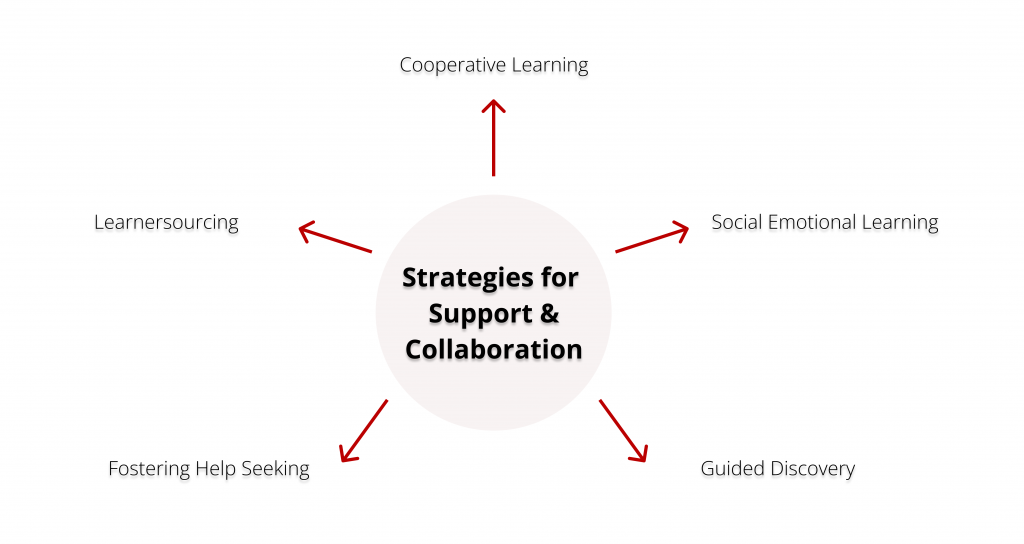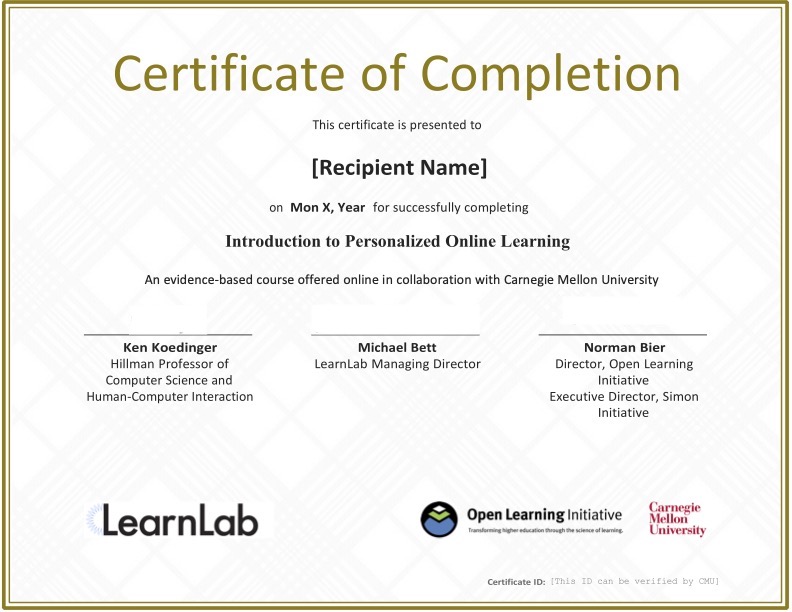Strategies for Support & Collaboration in Online Learning


Start Any Time
Work on your pace and you will have instructors available to help you answer any questions.

Duration
Approximately 6 weeks, 6-8 hours/week

Fee
$1500 - Professional Rate
$500 - Full-time Student Rate*
*Proof of full time student enrollment required. Acceptable forms of id include a letter from your university’s registrar office or an unofficial transcript. Email your documents to learnlab-help@lists.andrew.cmu.edu
Certificate Course Description:
Strategies for Support & Collaboration in Online Learning teaches course developers how to improve learner outcomes by employing cooperative learning, social emotional learning (SEL) principles, guided discovery, strategies for fostering help seeking, and learnersourcing. You will explore how different cooperative learning methods work in different contexts, and learn where to best apply them. You will also learn to leverage effective feedback to enhance student engagement and learning. By the end of this course, you will be equipped with strategies and tools to create a more interactive, supportive, and collaborative online learning environment.
Our team hosts office hours for all courses over Zoom on the 2nd and 4th Wednesday of each month, 10:00 AM – 11:00 AM EDT/EST (4:00 PM – 5:00 PM CAT). On 2nd Wednesdays, Dr. Ken Koedinger, who is the Director of the Masters of Educational Technology and Applied Learning Sciences (METALS) program, will be available. On 4th Wednesdays, you will have the opportunity to speak with our learning engineers.
Module 1: Cooperative Learning
- Distinguish peer learning from cooperative learning
- Articulate the goals of the Jigsaw method
-
Identify examples of cooperative learning
Module 2: Social Emotional Learning
- Define social emotional learning
- Identify five key competencies that social emotional learning (SEL) promotes within the CASEL framework
-
Promote SEL competencies in different contexts
Module 3: Guided Discovery
- Articulate the benefits of guided discovery, where they apply, and where they don’t
-
Design guided discovery interventions by leveraging effective feedback
Module 4: Fostering Help Seeking
- Identify the different stages in the help-seeking process (identifying you need help, deciding to seek help, deciding where to turn with questions, checking answer validity)
- Identify strategies that improve help-seeking in each stage in the help-seeking process (identifying you need help, deciding to seek help, deciding where to turn with questions, checking answer validity)
- Name strategies to leverage a learners’ prior knowledge to assist in the help-seeking process
-
Evaluate to what extent an existing tool fosters help-seeking behavior
Module 5: Learnersourcing
- Define learnersourcing
- Identify tasks that are appropriate for learnersourcing
- Name key challenges with learnersourcing
- Order key steps in implementing a learnersourcing task
-
Explain the method(s) behind each key step in implementing a learnersourcing task
Module 6: Course Project
At the end of this course, you’ll have an opportunity to demonstrate your knowledge by revising and improving a lesson plan using the techniques covered in this course. You’ll also create a guide that synthesizes what you have learned. The project will be graded by the instructor and you will receive personalized feedback along with a sample solution.
None.
Researchers, product/UX designers, instructional designers, and anyone interested in edTech.
What you'll learn
By the end of this course, you will be able to:
- Implement cooperative learning techniques, including the jigsaw method, to facilitate effective peer interactions
- Apply core social emotional learning (SEL) competencies
- Design guided discovery activities
- Promote help-seeking behaviors in an educational context, supporting students’ ability to recognize the need for help, seek assistance, find appropriate resources, and validate the answers they receive
- Utilize learnersourcing to improve educational experiences
Course Instructors

Dr. Ken Koedinger
is a professor of Human-Computer Interaction and Psychology at Carnegie Mellon University. Dr. Koedinger has an M.S. in Computer Science, a Ph.D. in Cognitive Psychology, and experience teaching in an urban high school. His multidisciplinary background supports his research goals of understanding human learning and creating educational technologies…
Certificate
Upon successful completion of the program, participants will receive a verified digital certificate of completion from Carnegie Mellon University’s Open Learning Initiative.

In addition to the knowledge and immediately applicable frameworks you will gain by attending your selected courses, you will benefit from:
- A digital, verified version of your Executive Certificate (Smart Certificate) you can add to your resume and LinkedIn
- Networking with a global group of your peers and instructors for advancing your career
Register Now
Register and start taking the course:
1. Enter your email address
2. Register using this link: https://proton.oli.cmu.edu/sections/join/tpqyx
Please note that all of our certificate courses have a 48 hour grace period before payment is required.


